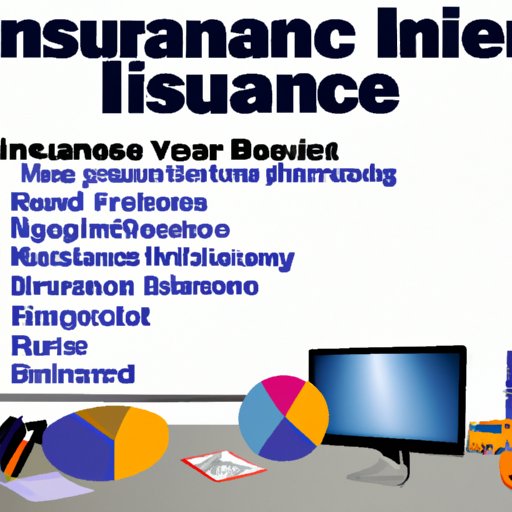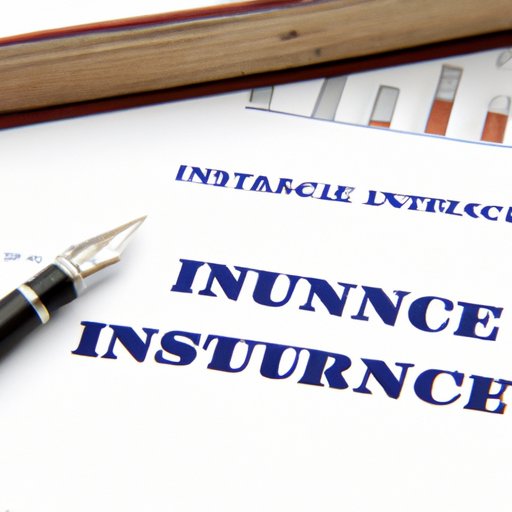Introduction
Business insurance is a type of insurance policy designed to protect businesses from potential financial losses due to unforeseen circumstances such as accidents, theft, natural disasters, and other liabilities. This type of insurance can help companies to stay afloat during difficult times, while also providing peace of mind to owners and employees.
In this article, we will explore how much business insurance costs, what factors influence the cost, and how to determine the appropriate levels of coverage for your business. We will also discuss the different types of business insurance and the benefits of having it.
Examining Factors That Influence Business Insurance Costs
There are several factors that determine the cost of business insurance, including: location, industry, size of business, and type of coverage. Let’s take a closer look at each of these factors.
Location
The location of a business can have a major impact on the cost of insurance. Companies located in areas with higher crime rates, for example, may pay more for their business insurance due to the increased risk of theft or vandalism. Additionally, businesses located in areas prone to natural disasters, such as hurricanes or earthquakes, may pay more for coverage to protect against potential losses.
Industry
The industry a business is in can also affect the cost of insurance. Industries that are considered high-risk, such as construction or manufacturing, may pay more for their insurance due to the potential for costly accidents or liability claims. On the other hand, businesses in less risky industries, such as professional services, may pay less for their coverage.
Size of Business
The size of a business is another factor that can influence the cost of business insurance. Generally, larger businesses may pay more for their coverage due to the increased risk associated with them. Smaller businesses, on the other hand, may be able to get lower rates due to their reduced risk profile.
Type of Coverage
The type of coverage a business chooses can also affect the cost of its insurance. Businesses that opt for comprehensive coverage may pay more for their policies, while those that choose basic coverage may pay less. Additionally, businesses may be able to save money by bundling different types of coverage into one policy.
Comparing Business Insurance Costs Across Different Industries
The cost of business insurance can vary significantly across different industries. According to research conducted by The Hartford, manufacturing businesses typically pay the most for their coverage, followed by retail businesses and then professional services businesses.
Manufacturing
Manufacturing businesses typically pay the most for their business insurance due to the high risk associated with their operations. Manufacturers often use large pieces of equipment that can cause serious injury if not operated properly, and they are also at risk of costly lawsuits if a product fails or causes harm.
Retail
Retail businesses typically pay slightly less for their business insurance than manufacturing businesses due to the lower risk associated with their operations. However, they still face risks related to customer injuries, damages to property, and potential lawsuits.
Professional Services
Professional services businesses typically pay the least for their business insurance due to the lower risk associated with their operations. These businesses are generally at less risk of property damage or customer injury, but may still be liable for negligence or malpractice.

A Guide to Determining How Much Business Insurance You Need
When determining how much business insurance you need, it is important to consider the risks associated with your business. To do this, follow these steps:
Risk Assessment
First, assess the risks associated with your business and determine which types of coverage are necessary. Consider the potential for property damage, customer injuries, lawsuits, and other liabilities. This will help you decide which types of coverage you need and how much coverage is appropriate.
Establish Your Budget
Once you know what coverage you need, establish a budget for your business insurance. Consider how much you can afford to spend and how much coverage you need. This will help you determine the right level of coverage for your business.
Research Available Policies
Finally, research the available policies to find the one that best meets your needs. Look for policies with competitive rates and comprehensive coverage.

Exploring the Benefits of Purchasing Business Insurance
Having adequate business insurance can provide many benefits, including: financial protection, peace of mind, and compliance with laws and regulations. Let’s take a closer look at each of these benefits.
Financial Protection
Business insurance can provide financial protection in the event of an unexpected loss. In the event of a lawsuit, accident, or other incident, the insurance can help cover medical expenses, property damage, legal fees, and other costs associated with the incident.
Peace of Mind
Having sufficient business insurance can also provide peace of mind for business owners and employees. Knowing that your business is protected can give you the confidence to focus on running the business without worrying about potential financial losses.
Compliance with Laws and Regulations
Many states and local governments require businesses to carry certain types of business insurance in order to operate legally. Having the necessary coverage can help ensure that your business is compliant with all applicable laws and regulations.
Breaking Down the Different Types of Business Insurance
There are several types of business insurance available, including: general liability, property insurance, workers’ compensation, professional liability, cyber liability, and directors & officers liability. Let’s take a closer look at each of these policies.
General Liability
General liability insurance covers third-party claims of bodily injury, property damage, and advertising injury. It also provides coverage for defense costs and settlements associated with these claims.
Property Insurance
Property insurance provides coverage for physical assets owned by the business, such as buildings, equipment, inventory, and furniture. It can also cover the cost of replacing lost or damaged items.
Workers’ Compensation
Workers’ compensation insurance provides coverage for medical expenses and lost wages for employees who are injured or become ill while on the job. This type of coverage is required in most states.
Professional Liability
Professional liability insurance provides coverage for claims of negligence, errors, and omissions. This type of coverage is often required for certain professions, such as doctors and lawyers.
Cyber Liability
Cyber liability insurance provides coverage for losses resulting from data breaches, cyber attacks, and other technology-related incidents. This type of coverage is becoming increasingly important for businesses that store customer data or process payments online.
Directors & Officers Liability
Directors & officers liability insurance provides coverage for claims of mismanagement or wrongful acts by directors and officers of the company. This type of coverage is important for businesses with multiple owners or shareholders.
Understanding Business Insurance Premiums
Business insurance premiums are the amount of money paid by the insured to the insurer in exchange for coverage. The cost of the premium is determined by a variety of factors, including the risk associated with the business, the type of coverage purchased, and the amount of coverage purchased.
Calculating the Cost
Insurance companies calculate the cost of a business insurance premium by assessing the risk associated with the business. They then assign a rate based on the level of risk, which is used to determine the premium amount. Generally, businesses with higher risks will pay higher premiums.
Factors that Affect Premiums
The cost of business insurance premiums can also be affected by other factors, such as the size of the business, location, industry, and type of coverage. Additionally, the cost of premiums can vary from one insurer to another, so it is important to shop around for the best rate.

Analyzing the Cost of Business Insurance Over Time
The cost of business insurance can change over time due to a variety of factors. Inflationary trends, new policies, and changes in the risk associated with a business can all affect the cost of business insurance.
Inflationary Trends
Inflation can have a major impact on the cost of business insurance. As inflation increases, so does the cost of coverage. This means that businesses must adjust their budgets accordingly to account for the rising cost of insurance.
New Policies
Insurance companies may also introduce new policies or update existing ones, which can affect the cost of premiums. For instance, if a new policy is introduced that offers more comprehensive coverage, businesses may have to pay more for their coverage.
Conclusion
Business insurance is an important tool for protecting businesses from financial losses due to unforeseen circumstances. The cost of business insurance is determined by a variety of factors, including location, industry, size of business, and type of coverage. It is important to understand how much business insurance you need and to compare policies to find the best coverage for your business. Finally, it is important to keep in mind that the cost of business insurance can change over time, so it is important to monitor the market and adjust your budget accordingly.
(Note: Is this article not meeting your expectations? Do you have knowledge or insights to share? Unlock new opportunities and expand your reach by joining our authors team. Click Registration to join us and share your expertise with our readers.)
